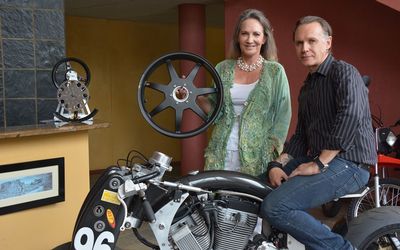TERRY Annecke lifts a carbon fibre wheel on one slender finger while Gary Turner, a former European motorcycle racing championships rider, explains how their BlackStone Tek wheels have revolutionised the industry globally.
Their low-weight, high-strength wheels built for speed, lightness and safety make bikes easier to handle, and allow for quicker acceleration and much faster braking. These are vital ingredients in a winning formula that has made BlackStone Tek (BST) the first company in the world to create such wheels in a repeatable and "handmade" industrialised process.
BST supplies aftermarket wheels for every global well-known brand including Harley-Davidson and Suzuki. But, it also has several exclusive original equipment manufacturer customers that produce ultra-exclusive motorcycles including Confederate, Norton and Motus — names that make motorcycling enthusiasts drool.
In the past 14 years, high-end machine designers have increasingly chosen BST to supply their wheels from their factory north of Johannesburg.
AeroMobil, the flying car prototype, uses them. So do many land speed-record bikes.
"Almost every electric motorcycle in the world is running on BST wheels," says Annecke, the company’s marketing and operations director.
Turner was racing in Europe in the 1980s and ’90s and managing a motorcycle shop in Holland, when he wondered if the carbon fibre used for parts on his motorbikes could work in a wheel. Made of strands thinner than human hair, carbon fibre is five times as strong as steel and twice as rigid.
"There was only one company, in the UK, that made carbon fibre wheels. But the quality and design, for our purposes, was flawed and it was extremely expensive," says Turner, BST managing director.
As he began researching how to improve costs, he discovered part of the answer lay back home in SA.
"Many years ago, the CSIR (Council for Scientific and Industrial Research) wanted to understand how carbon fibre behaved in certain circumstances and chose a motorcycle wheel for their academic research. That has formed the basis of BST," says Turner.
ANNECKE says the company’s wheels are unique. They are monocoque — a single unit – with five or seven hollow spokes.
"We do not bond pieces together and we patented that manufacturing process," she says.
It was when Turner finalised the design and realised he needed to start a business to manufacture and sell the wheels, that Annecke came into the picture.
She had worked for IBM and Microsoft in their product-management, technical, sales and executive arenas with a high media profile, and left to become a founder and shareholder of BST. Annecke responded to the offer to join it in 2001 because carbon-fibre material, "was such a game changer back then. It was so different and challenging," she says.
BST had three shareholders initially and has been privately funded for the most part.
"We’ve had some support from the Department of Trade and Industry’s Innovation Programme — we won their award in 2002," says Annecke. The many awards that BST has won are too numerous to list here, but the latest one, the 2015 JEC Paris composites award in the sport and leisure category, was a big achievement.
JEC is the largest composites industry organisation in the world.
Initially wary motorcyclists were soon convinced that the domestic technology was safe. BST’s wheels are tested internationally.
The company’s exacting standards are plain to see — dotted around the factory are quality charts ticked at every level of the extremely complex manufacturing process. Each BST wheel has a unique serial number on its label.
"It’s like a ‘DNA’ marker and allows us to trace its entire history and build process," says Annecke.
When the company launched in 2002, "rumour had it there were only about 300 carbon-fibre motorcycle wheels in the world", says Turner.
In the first 18 months, they sold 700 and since then have produced 20,000, which are exported all over the world including to the UK and US, Japan and Australia.
"We export 98% of our product. When we started operating, the rand was weak against the dollar. When it recovered, it nearly destroyed us because it halved our income. But we’re nimble and picked ourselves up," says Annecke.
BST designs its own moulds, tooling, wheels and hubs, and manufactures them on site. The company uses cutting machines similar to those employed in the aeronautical industry to ensure that its manufacturing process is guaranteed to remain at the same high standard, and is repeatable.
The challenge was to create precise, repetitive manufacturing of these handmade works of art — in volume. In achieving this, BST created highly specialised jobs for 40 people.
The factory has a -20ºC storage chamber for carbon fibre, a huge oven and a hand-held spray-painting unit. Brilliantly coloured motorcycle parts and sparkling wheels are carefully nursed by the staff.
Both Turner and Annecke can’t keep their hands off the wheels, stroking and admiring them as they walk past. Their passion takes them frequently on overseas trips, particularly to the US where their products are in high demand, fitted in some cases to motorcycles worth more than $100,000.
"In the very near future, we’ll create a business presence in America. Apart from wanting to be closer to our existing customers, there’s huge market waiting for us to develop. And, we can create new products there," says Annecke.
But the manufacturing facility will not move offshore. There are rumours that a major motorcycle manufacturer is talking to BST, but the pair refuses to confirm this.
That’s surely good news for SA, which needs all the manufacturing and exports it can create.

Terry Annecke and Gary Turner in the BlackStone Tek Johannesburg factory. BST supplies aftermarket wheels for well-known and original equipment manufacturer motorcycle brands. Picture: SUE GRANT-MARSHALL
TERRY Annecke lifts a carbon fibre wheel on one slender finger while Gary Turner, a former European motorcycle racing championships rider, explains how their BlackStone Tek wheels have revolutionised the industry globally.
Their low-weight, high-strength wheels built for speed, lightness and safety make bikes easier to handle, and allow for quicker acceleration and much faster braking. These are vital ingredients in a winning formula that has made BlackStone Tek (BST) the first company in the world to create such wheels in a repeatable and "handmade" industrialised process.
BST supplies aftermarket wheels for every global well-known brand including Harley-Davidson and Suzuki. But, it also has several exclusive original equipment manufacturer customers that produce ultra-exclusive motorcycles including Confederate, Norton and Motus — names that make motorcycling enthusiasts drool.
In the past 14 years, high-end machine designers have increasingly chosen BST to supply their wheels from their factory north of Johannesburg.
AeroMobil, the flying car prototype, uses them. So do many land speed-record bikes.
"Almost every electric motorcycle in the world is running on BST wheels," says Annecke, the company’s marketing and operations director.
Turner was racing in Europe in the 1980s and ’90s and managing a motorcycle shop in Holland, when he wondered if the carbon fibre used for parts on his motorbikes could work in a wheel. Made of strands thinner than human hair, carbon fibre is five times as strong as steel and twice as rigid.
"There was only one company, in the UK, that made carbon fibre wheels. But the quality and design, for our purposes, was flawed and it was extremely expensive," says Turner, BST managing director.
As he began researching how to improve costs, he discovered part of the answer lay back home in SA.
"Many years ago, the CSIR (Council for Scientific and Industrial Research) wanted to understand how carbon fibre behaved in certain circumstances and chose a motorcycle wheel for their academic research. That has formed the basis of BST," says Turner.
ANNECKE says the company’s wheels are unique. They are monocoque — a single unit – with five or seven hollow spokes.
"We do not bond pieces together and we patented that manufacturing process," she says.
It was when Turner finalised the design and realised he needed to start a business to manufacture and sell the wheels, that Annecke came into the picture.
She had worked for IBM and Microsoft in their product-management, technical, sales and executive arenas with a high media profile, and left to become a founder and shareholder of BST. Annecke responded to the offer to join it in 2001 because carbon-fibre material, "was such a game changer back then. It was so different and challenging," she says.
BST had three shareholders initially and has been privately funded for the most part.
"We’ve had some support from the Department of Trade and Industry’s Innovation Programme — we won their award in 2002," says Annecke. The many awards that BST has won are too numerous to list here, but the latest one, the 2015 JEC Paris composites award in the sport and leisure category, was a big achievement.
JEC is the largest composites industry organisation in the world.
Initially wary motorcyclists were soon convinced that the domestic technology was safe. BST’s wheels are tested internationally.
The company’s exacting standards are plain to see — dotted around the factory are quality charts ticked at every level of the extremely complex manufacturing process. Each BST wheel has a unique serial number on its label.
"It’s like a ‘DNA’ marker and allows us to trace its entire history and build process," says Annecke.
When the company launched in 2002, "rumour had it there were only about 300 carbon-fibre motorcycle wheels in the world", says Turner.
In the first 18 months, they sold 700 and since then have produced 20,000, which are exported all over the world including to the UK and US, Japan and Australia.
"We export 98% of our product. When we started operating, the rand was weak against the dollar. When it recovered, it nearly destroyed us because it halved our income. But we’re nimble and picked ourselves up," says Annecke.
BST designs its own moulds, tooling, wheels and hubs, and manufactures them on site. The company uses cutting machines similar to those employed in the aeronautical industry to ensure that its manufacturing process is guaranteed to remain at the same high standard, and is repeatable.
The challenge was to create precise, repetitive manufacturing of these handmade works of art — in volume. In achieving this, BST created highly specialised jobs for 40 people.
The factory has a -20ºC storage chamber for carbon fibre, a huge oven and a hand-held spray-painting unit. Brilliantly coloured motorcycle parts and sparkling wheels are carefully nursed by the staff.
Both Turner and Annecke can’t keep their hands off the wheels, stroking and admiring them as they walk past. Their passion takes them frequently on overseas trips, particularly to the US where their products are in high demand, fitted in some cases to motorcycles worth more than $100,000.
"In the very near future, we’ll create a business presence in America. Apart from wanting to be closer to our existing customers, there’s huge market waiting for us to develop. And, we can create new products there," says Annecke.
But the manufacturing facility will not move offshore. There are rumours that a major motorcycle manufacturer is talking to BST, but the pair refuses to confirm this.
That’s surely good news for SA, which needs all the manufacturing and exports it can create.




















Change: 1.19%
Change: 1.36%
Change: 2.19%
Change: 1.49%
Change: -0.77%
Data supplied by Profile Data
Change: -0.08%
Change: 0.12%
Change: 1.19%
Change: 0.00%
Change: 0.10%
Data supplied by Profile Data
Change: 0.32%
Change: 0.40%
Change: 0.40%
Change: 0.22%
Change: 0.58%
Data supplied by Profile Data
Change: 0.08%
Change: -0.41%
Change: -0.13%
Change: -0.33%
Change: 0.10%
Data supplied by Profile Data